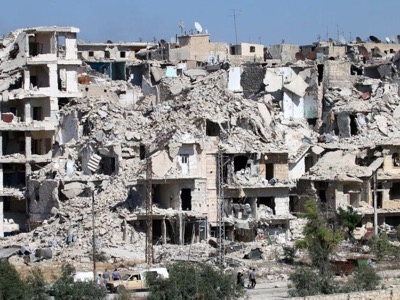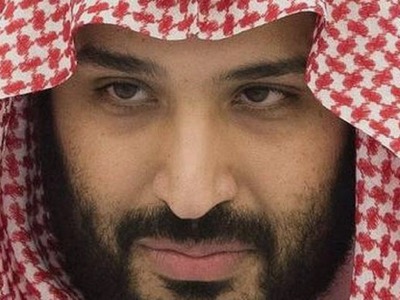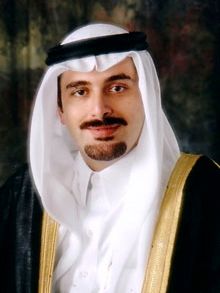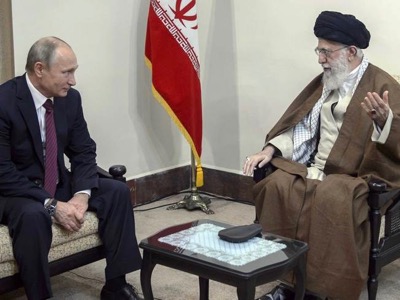Palace Coup in Riyadh
While the war against Daesh is drawing to a close in Iraq and Syria, and the war against the pseudo-Kurdistan seems to have been avoided, several States of the Greater Middle East are regaining the initiative. Profiting from the fluidity of the moment, the Crown Prince of Saudi Arabia has brutally eliminated the members of the royal family who may be in a position to contest his Power. So not only has the regional balance of power been modified by war, but one of the region’s main actors has just changed its objectives.

- After seven years of war, entire cities have been razed to the ground in Afghanistan, Saudi Arabia, Iraq, Libya, Syria, Turkey and Yemen, but no frontiers have been modified.
A new period in the Middle East
It is said that Nature abhors a vacuum. The defeat of the « Islamic Emirate in Iraq and Syria » (or « Daesh », according to its Arab acronym) – which, in quick succession, has just lost Mosul, under the onslaught of the Iraqi army, Rakka, taken by the US army, and Deir ez-Zor, liberated by the Syrian army – ends a war and opens a new period. The failure of Massoud Barzani to force recognition for the annexation of Kirkuk by the Kurds of the PDK cancels the project for a new colonial State, a pseudo-Kurdistan, an advance base for the Israëli army against Iran.
Although the Greater Middle East is devastated, particularly Libya, Syria, Iraq, Yemen and Afghanistan, there still remain four States capable of advancing their interests - Israël, Saudi Arabia, Turkey and Iran. In order to do so, each of them will have to adopt an initiative before the meeting between Presidents Donald Trump and Vladimir Putin, which is scheduled to take place during the APEC summit in Danang (8 to 10 November).
On 3 November, Israël declared itself ready to protect the Druzes, from the South of Syria, against the jihadists who had just attacked the Syrian village of Hader. Since the beginning of 2017, Tel-Aviv has been trying to create a Druze separatist movement in the South of Syria on the model of the one it had built with the Kurds from the North and Iraq. Mossad recruited Syrian Major Khaldoun Zeineddine, who attempted to declare a « Druzistan ». But he managed to raise only a dozen combatants willing to fight Damascus.
On the same day, Turkey gathered the different jihadist organisations from Idleb in order to create a « Government of National Salvation », presided by Muhammad Al-Sheikh, and including Riyad Al-Asaad as Vice-Prime Minister. For the governorate of Idleb, Ankara recycled the idea of its Qatari ally, which, in 2012, had already founded an alternative Syrian government under the title of the « Syrian National Coalition ».
There has been no sign from Teheran, probably because the Islamic Republic of Iran is the only one of the four great States which has beaten both Daesh and the Barzanis. It therefore has no interest in changing the deal.
The surprise came from Riyadh. The royal family has not sought to impose a new regional order, but Prince Mohammed ben Salame (« MBS ») has shaken up the fossilised structure of his kingdom.
The resignation of Saad Hariri
On 4 November at about 11 a.m. UTC, the Lebanese Prime Minister, speaking on the TV channel Al-Arabiya, live from the Hotel Ritz in Riyadh, and in the presence of the Saudi Crown Prince « MBS », announced his resignation. Reading carefully from the text which had been written for him, Saad Hariri suddenly forgot that he was President of a government which included ministers from Hezbollah. He expressed himself in these terms - « Wherever Iran is present, it sows division and destruction. The proof of this is evident in their interference in the Arab countries, without mentioning its deep grudge against the Arab nation (…) Iran maintains a grip on the destiny of the countries of the region (...) Hezbollah is the arm of Iran, not only in Lebanon, but also in the other countries (…) Unfortunately, I have realised that certain compatriots are working hand in hand with Iran, and are trying to force Lebanon out of its Arab environment. Glorious People of Lebanon, Hezbollah has succeeded, thanks to the force of arms, in imposing a de facto situation (…) I want to tell Iran and its acolytes that they have lost. The hands that clutch at the Arab States will be cut off, and evil will turn on those who use it. »
This dramatic text buries the religious Sunni / Chiite conflict and relaunches the racist conflict of the Arabs against the Persians. This is a form of progress, despite appearances, insofar as the occasions for war are more limited - the Sunnis and the Chiites live together, while the Arabs and the Persians are settled in distinct territories. In concrete terms, for Lebanon, this shake-up does not really change much. Above all, the text offers no indication of the reasons for the Prime Minister’s resignation.
Saad Hariri added that he was afraid for his life. Shortly afterwards, Al-Arabiya explained that a few days earlier, Hariri had escaped an assassination attempt. However, first the Lebanese police, then Lebanese General Security expressed their doubts by denying that they had any knowledge of such an attack. Al-Arabiya assured that Rafic Hariri, Saad’s father, had been assassinated in 2005 by Iran – despite the fact that the same channel had persisted for years in accusing the Lebanese and Syrian Presidents, Emile Lahoud and Bachar el-Assad, of having ordered the murder.
Once he had finished his speech, Saad Hariri telephoned the Lebanese President, Michel Aoun, to inform him officially of his resignation. The conversation was very brief, and he did not answer the question as to why he had resigned.
The Saudi Minister for Affairs of the Gulf, assured that, contrary to what one might think at first, Saudi Arabia had not imprisoned Saad Hariri, and that he could return to Lebanon whenever he liked. Since the rumours of his arrest persisted, the Prime Minister’s Twitter account shared a photo of him in a polo shirt, with the Saudi ambassador for Lebanon.
Even before Saad Hariri had finished his speech, his rival, the ex-Central Director of the police (FSI) then Lebanese Minister for Justice, Achraf Rifi, headed to Beirut from his Italian exile. As it happens, since Mister Hariri is one of the most profoundly indebted people on the planet - he owes a personal debt to the Saudi government of about four billion dollars – he is probably not in a position to take decisions which go against the interests of his creditor.
At about 11 p.m. UTC, Houthi rebels fired a ballistic missile, from Yemen, at the King Khaled airport in Riyadh. It was intercepted by a salvo of Patriot anti-missile missiles. Since the Houthis’ sophisticated weapons were supplied by Iran, observers made a connection between Hariri’s resignation and the missile shot, and agreed that they all interpreted the operation as a response to Saad Hariri’s anti-Iranian discourse.

- In a few hours, Mohamed Ben Salmane eliminated all other potential contenders to the throne and their principal allies.
The seizure of power by « MBS »
Events began to speed up. A few minutes later, King Salmane signed two decrees. The first placed the Chief of Marine Staff in early retirement, and also dismissed the Minister of the Economy and the Minister of the Royal Guard, the very powerful son of ex-King Abdallah, Prince Muteb. The second decree set up a Commission for the fight against corruption, under the presidency of « MBS ». The Press also announced the implementation of the new antiterrorist law, which incidentally includes dispositions condemning offenders to prison sentences of between 5 and 10 years for any defamation or public insult against the King or the Crown Prince.
Within the hour, the Commission for the fight against corruption met and adopted a series of measures which had been prepared well in advance. Eleven princes, four serving ministers and dozens of ex-ministers were accused of embezzlement. They were immediately arrested by the new commander of the Royal Guard and some of them faced charges under the new anti-terrorist law. In the box were the three personalities who had been stripped of power earlier in the day by the King, including the ex-Commander of the Royal Guard, Prince Muteb. We learned later in the day that the bank accounts of the suspects had been seized, and that if they were to be declared guilty – a simple formality – their wealth would be transferred to the National Treasury.
According to the Saudi Press Agency, the suspects apparently diverted money during the floods of 2009 and the coronavirus crisis (MERS – The Middle East Respiratory Syndrome) – an accusation which may be well-founded but does not distinguish them from the other Caziques of the regime.
Although no nominative list of the suspects has been published, we know that Prince Walid Ben Talal is on it. Considered to be one of the wealthiest men in the world, he was the kingdom’s secret ambassador to Israël. His company, the Kingdom Holding Company, a share-holder notably of Citygroup, Apple, Twitter and Euro-Disney, fell by 10 % at the opening of the Riyadh Stock Exchange on Sunday morning, before its credit rating was suspended.
Contrary to appearances, it seems that the victims of the purge were not chosen because of their functions or their ideas, which seems to confirm the official anti-corruption story.
On Sunday evening, a helicopter crashed near Abha. We learned that several dignitaries died in the accident, including a certain Prince Mansour.
The success of « MBS », who has just overturned the oligarchy in order to install his autocracy, does not, however, guarantee his capacity to govern. Aged only 32, this entitled rich kid from a super-wealthy family has hardly had the time to get to know his people, and only entered politics two year ago. His first decisions were catastrophic - decapitation of the leader of the opposition and the war against Yemen. Having neutralised all those who could have stood against him within the royal family, « MBS » has no choice but to ensure himself of popular support in order to be able to exercise Power. He has already taken various measures in favour of the young (70 % of the population) and women (51 % of the population). For example, he has opened cinemas and organised concerts – which until now had been forbidden. As from 2018, women will be allowed to drive. He will soon have to abolish the sinister religious police on one hand and the tutelage system on the other – both to satisfy women and also free men from this charge – making it possible to kick-start the economy. Above all, « MBS » has announced that he wants to transform Islam in his country and make it a « normal » religion. He has declared that he not only wants to modernise Wahhabism, but also to cleanse the Hadîths - the golden legend of Mohammed – of their violent or contradictory passages. This is a secular project which goes against the practice of the whole of the Muslim community over the last few centuries.
This strategy prevents « MBS » from waging a war against Iran and Hezbollah, and gives the lie to the current official story – it is impossible to imagine a war against Teheran because ever since the Revolutionary Guard came to help the Houthis, Saudi Arabia has suffered defeat after defeat in Yemen. And it is also impossible to rally the Saudis to the flag while « MBS » is radically reforming society.
Retrospectively, this palace coup had been announced a few days earlier. « MBS » had indeed declared that it was necessary to be ready for a change which would occur in the night of Saturday to Sunday. It is obviously impossible that the collapse of the Lebanese government and the decapitation of the Saudi royal family could have been organised without Washington’s approval. An agreement was discreetly concluded with « MBS » that the public offer of the sale of Aramco would be launched not in Riyadh, but on the New York Stock Exchange. Furthermore, the anti-Iranian speech by Saad Hariri was preceded by a Washington campaign. Since 10 October, the Trump administration has promised rewards for the arrest of two commanders of the Lebanese Resistance, and presented a plan against the financial activities of the Iranian Revolutionary Guard, while Congress has voted no fewer than five laws against Hezbollah.
Hypothesis for analysis

- Saad Hariri, Saudi-Lebanese double nationality, is an illegitimate son of the royal Abdallah clan.
No media will make the connection between the resignation of Saad Hariri and the purge of the royal family. In the same way, the Press does no more than mention the Palace Coup without asking the identity of the arrested suspects. It’s true that it has forgotten the way absolute monarchies work. I shall propose a different hypothesis for the analysis of these events – before anything else, let’s remember that at the death of King Abdallah, the Crown Prince was his friend Prince Moukrine. The royal family was divided into three clans – the clan of Abdallah’s son, Prince Muteb, the clan of Minister for the Interior Neyef, and the clan of King Salmane’s son, « MBS ». Let’s also remember the secret that is not a secret - Saad Hariri is not the biological son of his legal father, but a bastard of the Saoud family, born into the Abdallah clan.
In April 2015, Crown Prince Moukrine was relieved of his functions. Mohamed Ben Nayef succeeded him, and « MBS » entered into politics by suddenly becoming the second Crown Prince. In June 2017, « MBS » managed to get rid of Nayef and had him placed under house arrest. In order to be not only the first Crown Prince, but also the only contender, he now had to eliminate the Abdallah clan. For that, he had to strip Prince Muteb of power, despite his control over the Royal Guard, not forgetting Saad Hariri, who could have offered help to the members of his clan in his quality as Prime Minister of Lebanon.
If Saad Hariri has not yet been arrested, it’s because despite his resignation, he is still acting – provisionally – as the Prime Minister of Lebanon in order to expedite current affairs until his successor takes his post. Achraf Rifi, who has returned to Beirut in order to occupy the position, needs to wait a little before being legally nominated. Particularly since President Michel Aoun does not wish to rush events and intends to clarify the current state of affairs before going any further. This will take even longer since Hassan Nasrallah, the Secretary General of Hezbollah, did not hesitate to defend Saad Hariri during a televised speech on Sunday night. He confirmed that the Prime Minister had resigned under pressure from « MBS », and that this event constituted one more Saudi interference in Lebanon’s affairs.
As if to show that no-one could rival with « MBS », it was also necessary to cut away the branch of ex-Crown Prince Moukrine. This was accomplished with the helicopter crash which killed his son, Prince Mansour.
Neither Saad Hariri himself, nor Iran, could have anticipated the events of 4 and 5 November. The Guide Ali Khameneï had sent the ex-Minister for Foreign Affairs, Ali Akbar Velayati, to take a tour in Lebanon, where he met each Lebanese leader, including the Prime Minister. All the meetings went well, and the meeting with Saad Hariri ended with an exchange of congratulations. It was only a few minutes later that Hariri was urgently called back to Riyadh.
Moscow and Washington are the only ones who gain from the Palace Coup
Attentive to what was going on, Russia accompanied the movement by extending its influence. King Salmane went to Moscow on 5 October. Although he is allied with the United States, he has, like his Turkish counterpart, President Recep Tayyip Erdoğan, bought Russian weapons – including S-400 missiles. Having abandoned his support for terrorism since President Donald Trump’s speech in Riyadh last May, he has managed to agree on a plan for the exchange of anti-terrorist intelligence. Above all, after having signed a great number of contracts, there now exists an agreement to maintain the limitations on the production of oil after the public offer of the sale of Aramco, which should favour speculation, and consequently, higher prices. This latter agreement has been finalised and discreetly signed recently in Tachkent.
Then President Vladimir Putin went to Teheran on 1 November. He assured his Iranian counterpart, Cheikh Hassan Rohani, that the declarations of his US opposite number contesting the 5+1 agreements concerning nuclear energy would not be followed through. He reminded Guide Ali Khameneï of the Israëli demand that there be no Revolutionary Guards and no Hezbollah in Southern Syria. Above all, he agreed with the Ayatollah about a plan for the future Syria based on the idea that soon Saudi Arabia would cease to play a destructive role.
Finally, the Greater Middle East has everything to gain by Saudi Arabia evolving from obscurantist dictatorship to enlightened despotism. In any case, the change in methods, leaders and objectives in Riyadh opens many opportunities. Each of the regional actors will attempt to adapt even faster in order to promote their interests before the situation freezes once again.
Translation
Pete Kimberley
Pete Kimberley










No comments:
Post a Comment